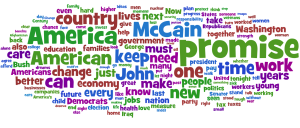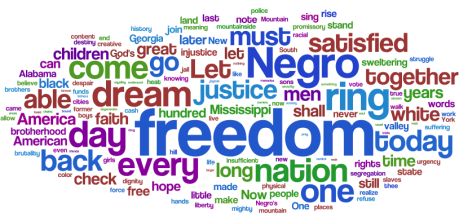There seems to be a bit of traffic to and through this blog, looking for word clouds of and/or commentary on President-elect Obama’s acceptance speech in Chicago. Given that until now there was nothing on that topic, I have a feeling they left relatively empty-handed. Let me fix that now, with a quick zip through Obama’s three key speeches, at the DNC in 2004, at the same event in 2008 and his most recent speech, in Chicago following his election as President.
Obama in 2004: A man of hope
The speech that marked Obama’s “explosion” on to the national scene in 2004 revolved primarily around the Democratic candidate, John Kerry, and the country at stake, America, as might be expected. The key concept aside from that which shines out is hope – one very much associated with the President-elect again since his election. A full word cloud is on wordle.net and previewed below.
Obama in August 2008: A man of promise
Four years later, as I’ve posted about previously, he’d moved from his hope to his promise – very apposite, seeing as his was now the focal points for others’ hopes, on which he was promising to deliver, rather than expressing his own views and hopes.
As I said at the time, this tied in a motif from Dr. Martin Luther King, Jr’s famous “I have a dream” speech – again, something widely referenced in recent days – on America’s promissory note, of liberty for all, which it had up to then failed to cash.
Obama in November 2008: A new America tonight, people
Earlier this week, when elected President from next January, he gave another speech which was destined to be analyzed to death by those with nothing better to be doing, such as myself! (His inauguration speech will presumably be the next one to be put under such scrutiny…) The link to and preview of a word cloud of his most recent speech is below.
Hope, promise – and indeed that third keyword perhaps most associated by his campaign, change – do not feature in any meaningful way. It’s perhaps surprising that promise makes no appearance, given that his Chicago speech is really the national equivalent of his DNC speech, to just his party. He obviously decided that the time was not right for more promises, it was instead a time to reflect on what his election meant, not for him but about his country.
His clear message from the speech seems to be: “Tonight, people, we have a new America!”. Whatever about the internal reaction to the election – after all, only 52% of voters voted for him – global reaction would seem to agree with his main sentiment!
Filed under: Politics | Tagged: Obama, presidential election, speeches, word clouds, wordle | 1 Comment »













